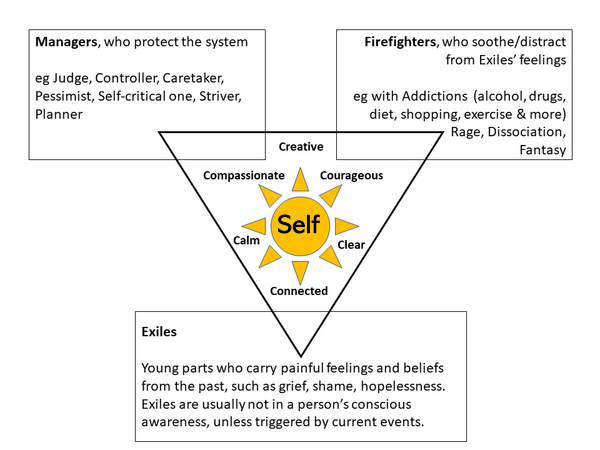The early days of Internal Family Systems (IFS)
In the 1980s a Chicago family therapist, Richard C Schwartz, developed IFS. As well as helping families, Schwartz also worked with some individual clients. He noticed that these clients often said things like, “Part of me feels excited, but another part feels scared.” Schwartz began to use family therapy techniques, thereby enabling individual clients to interact with these parts in a healing way, and was soon encouraged by his success. In addition to learning from his experience with clients, Schwartz read widely on the existing theories and therapies which involved working with parts of a person. He drew on the ideas of Carl Jung and Roberto Assagioli, and also on a number of spiritual traditions and practices. Little by little, Schwartz created IFS.
Key Principles of IFS
IFS insights into human nature include the following:
• It is normal for each person to have a number of parts. Having parts doesn’t make us crazy!
• Parts have positive intentions. To protect us, they often take on particular jobs or roles, but sometimes go a bit too far with them
• As well as our parts, we each have a Self. That’s who we are at the deepest level
• The Self is calm, compassionate, curious, clear-minded, connected, confident, courageous and creative
• IFS refers to a person’s inner world as that person’s “system.”
IFS therapy aims to strengthen the relationship between a person’s Self and their parts. The goal of IFS therapy is to become Self-led, ie to reach a point where the Self is able to take the lead in actions and communication.
Types of parts
There are three main kinds of role/job which parts take on:
(1) A Manager role. A manager’s job is to protect the person’s system by providing a particular way of being or attitude to life and other people. Managers are mainly focused on the future and on progression. A few typical examples of manager roles are: entertainer, caretaker, critic, perfectionist, planner.
(2) A Firefighter (sometimes called Distractor/Soother) role. These parts come to the rescue quickly to divert or calm a person if very painful feelings occur. Some Firefighters turn us to harmless activities like sleeping or watching TV. Others can be riskier, offering escape and relief through means such as drugs, violence or self-harm.
(3) An Exile Role. Exiles are usually young parts which carry painful feelings and beliefs from the past. Some feelings carried by Exiles can include shame, fear, hurt and abandonment. Along with such emotions, Exiles will often have taken on burdensome beliefs like "Nobody cares," "It's my fault," or "People will always let me down." Exiles are mostly kept out of a person’s awareness by Managers and Firefighters. However, they get activated when things happen which remind them of their original hurts.
The IFS view of a person's inner system
The diagram below shows the workings of a person's inner system, according to IFS theory.
This diagram has been adapted from Schwartz, 2001 (p142).
Overview of an IFS therapy session
The process of IFS therapy goes something like this:
1) The client and IFS practitioner discuss what the client wants to work on
2) An initial “target” part is agreed
3) Through a series of careful steps, the IFS practitioner assists the client to focus on this part and establish contact between the client’s Self and the part
4) During the process, other parts of the client may be activated. Each of these will either agree to step aside or, if the client wishes, may become the new target part
5) The client’s Self hears how the target part got into its job or role, and what it is trying to protect the system from
6) When a young (Exile) part is activated during the process, often this Exile is carrying burdens of negative feelings and beliefs from the past. If the client’s Self and the Exile choose, the IFS practitioner will guide them through a specific set of steps to help the Exile
7) Plenty of time is allowed for hearing reactions from other parts and for winding down the process towards the end of the session
8) The client’s Self offers to check in regularly with the Exile in the days ahead
9) There may also be an agreement to return to this part, or to other parts, in a future session.
References
Schwartz, R C (2001). Introduction to the Internal Family Systems Model. Oak Park, Illinois: Trailheads Publications.
For further information about IFS and to watch a short video introduction with Richard Schwartz, see the IFS website here







